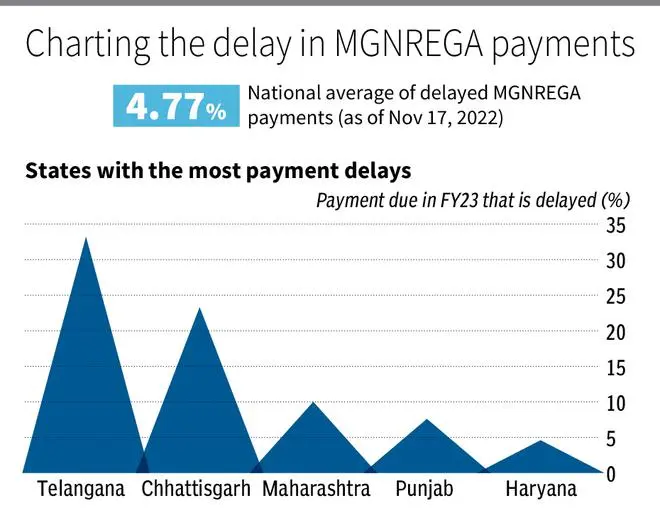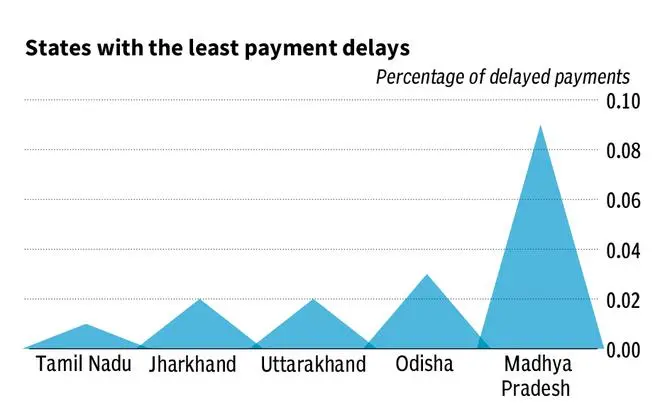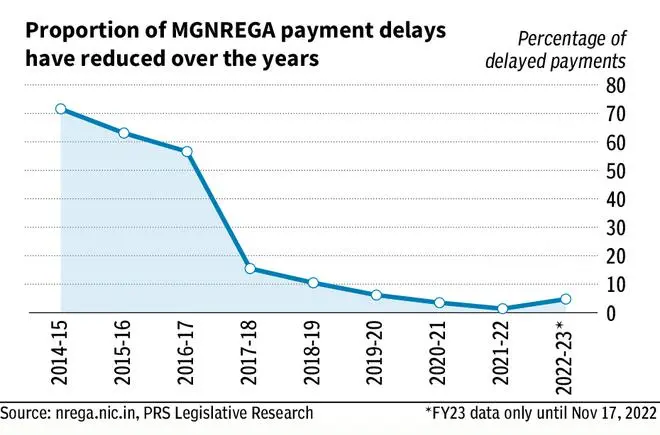In the ongoing fiscal, Telangana has the most proportion of delayed payments for work done under the Mahatma Gandhi National Rural Employment Guarantee Act (MGNREGA). Data until November 17, 2022, indicate that 33.2 per cent of the MGNREGA payments in the State were delayed. Any MGNREGA payment made 15 days or later since the completion of work is considered a delay.
In FY23, as many as 1.81 crore MGNREGA payment transactions were done in Telangana. Of these, 60.32 lakh were delayed. Most delayed payments in the State happened in Hanumakonda district, which has 12 blocks. Of these, the Nadikuda block has the most proportion of delays. Chhattisgarh follows suit with 23.3 per cent of the payments being delayed. Of the 75.38 lakh payments made, 17.5 lakh were delayed.

MGNREGA was passed in the Parliament on August 23, 2005, and was implemented the following year. “It aims to enhance livelihood and security in rural areas by providing at least 100 days of employment in a financial year to every household,” reads its mission statement. The jobs include cleaning canals and drains, tilling, ploughing and clearing weeds.
Ones that did well
At the same time, in 10 States, the payment delay was less than 1 per cent. The topper here is Tamil Nadu, where just 0.01 per cent of the payments were delayed. Of the 4,15,34,118 payments made in the State, only 5,326 were delayed. The other States with minimal payment delays are Jharkhand, Uttarakhand, Odisha, Madhya Pradesh, Karnataka, Kerala, Assam, Tripura and Gujarat.

These two extremes have contributed to setting the national average of MGNREGA payment delays at 4.77 per cent, as of November 17, 2022. India’s proportion of MGNREGA payment delays has been coming down significantly over years. While it was as high as 71.6 per cent in FY15 and 63.1 in FY16, it came down to 1.4 per cent in FY22.

Observing this trend, the 2018-19 Economic Survey said this is mostly because of Aadhaar Linked Payments (ALP). “In 2014-15, as many as 26.9 per cent of the payments were generated within 15 days, which has now risen to 90.4 per cent in 2018-19,” it said, adding, “The proportion of the total amount of wage payments that were received with a lag of more than 90 days before and after the implementation of ALP, it is found that the delay in payments reduced by almost one-third from 35 per cent to less than 10 per cent in the post-ALP period.”







Comments
Comments have to be in English, and in full sentences. They cannot be abusive or personal. Please abide by our community guidelines for posting your comments.
We have migrated to a new commenting platform. If you are already a registered user of TheHindu Businessline and logged in, you may continue to engage with our articles. If you do not have an account please register and login to post comments. Users can access their older comments by logging into their accounts on Vuukle.